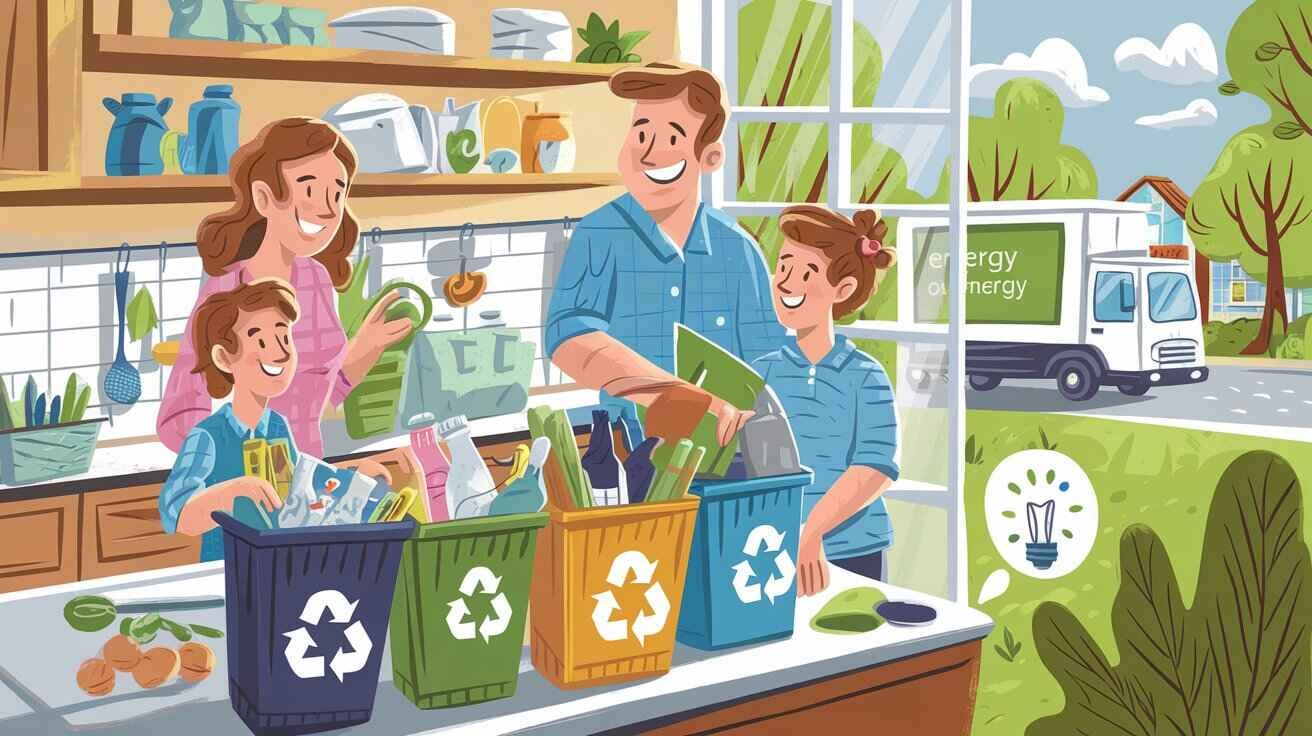
Recycling is one of the best ways to save energy. Inventing new materials from scratch is less energy-intensive, meaning less work is required. Recycling saves energy and benefits the environment is what we will discuss in this article.
If you’re interested in more general energy topics, I recommend reading our post The 7 Hidden Disadvantages of Solar Energy You Should Know, where we go into more detail about the pros and cons of renewable energy.
The Energy Cost of Producing New Materials
How Recycling Reduces Energy Use
Energy Savings by Recycling Different Materials
Environmental Benefits of Energy Savings through Recycling
How You Can Contribute to Energy Savings by Recycling
The Energy Cost of Producing New Materials
A huge energy expense is making new materials from scratch. Example: Mining raw metals, forcing trees for paper, and extracting oil to become plastics are all energy-intensive. All these activities burn up Fossil fuels (oil, gas, and coal) that release greenhouse gases. Also, making these materials means refining, processing, and transporting them all of which require considerable energy.
Recycling means that we continue to use still new raw materials for production, which increases our overall energy consumption. It forces our energy resources and makes us more polluted. For a detailed reading of this, read our guide on the disadvantages of renewable energy too.
How Recycling Reduces Energy Use
It takes a long way much less strength to recycle something than to make something from scratch. We do not ought to mine, refine, and manufacture substances we then reuse. It consumes as much as ninety-five percent much less power than making new aluminum from uncooked rely. Paper recycling saves about 60 percent of the strength that would be needed to produce virgin paper from trees, across the country.
Energy Savings by Recycling Different Materials
So, let’s take a look at some of the more common materials and see what energy savings we’ve gained from recycling.
a. Metals
Producing metals, such as aluminum and steel, is mostly energy-intensive. The Aluminum that is produced from raw materials uses 95% less energy than recycling it. Steel recycling is estimated around 60 – 74% energy saving. If you recycle a metal piece, you’re reducing energy used in the production chain.
b. Paper
In reality, recycling paper requires 60 percent less energy for the production of new paper from wood. The energy required to save an average home's energy for six months, or to prevent the felling of 17 trees, can be saved by burning only one ton of paper.
c. Plastics
Making new plastic calls for a whole lot of strength. It could keep as much as 70 percent of the strength used to make new plastic with plastic recycling. The power savings are big, though, and they are complex things due to the fact you have got such a lot of types of plastics.
d. Glass
Recycling glass saves 30 percent of the energy used to make new glass from natural materials. It is one of a very small number of materials that can be recycled when and if they are needed, without loss of quality. It also means that we don’t have to dig up sand and limestone to make new products, so we save energy, too.
Environmental Benefits of Energy Savings through Recycling
When we recycle and save energy, it helps when we don’t have to use so much fossil fuels like coal, oil, and gas. It cuts greenhouse gas emissions, a factor in climate change. Combatting global warming helps it rise which means lower emissions that are linked to rising sea levels, more severe weather, and ecosystem disruption.
But it also helps to reduce the need for harmful things like mining or deforestation. By way of example, recycling paper helps meet the market for new trees, leaving forests as vital habitats for wildlife where we would otherwise remove them for paper.
How You Can Contribute to Energy Savings by Recycling
Recycling every day makes a difference. Right here are some clean ways to make a contribution to power financial savings via recycling:
Recycle your household waste:
Pop yourself in the necessity of taking time to sort out paper, glass, plastics, and metals from your trash to minimize both time and energy wasted.
Aid recycling initiatives:
Begin recycling for your community, take part in or help applications for nearby recycling, or work closer to implementing better recycling infrastructure globally.
Purchase recycled merchandise:
Pick out products made from recycled materials. This motivates producers to continue creating products.
Reduce and reuse:
Don’t forget about recycling and don’t use something so disposable in any respect at other times. Moreover, the usage of merchandise as regularly as viable will help to save electricity.
Saving energy requires little more than recycling, which can be done in an easy, effective manner. Recycling therefore takes away the need for new materials and eliminates the need for a good part of the energy required for extraction, production, and transport. Not only does it help conserve natural resources and lower pollution, it is crucial for a sustainable future. Helping recycle every time we do helps a healthier planet and keeps energy saved for future generations.
